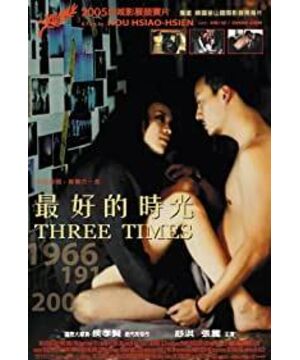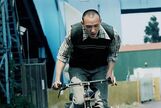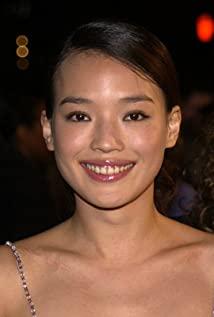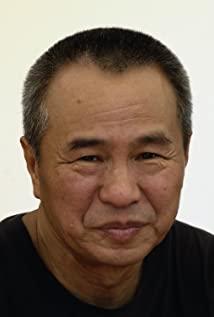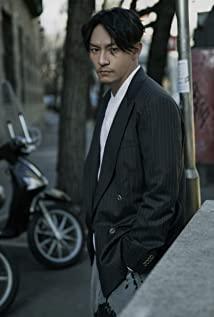What is the best time? I don't know, maybe only when things go wrong, and when I look back, I will understand what is best. Some people say that Hou Xiaoxian’s movies need to be watched twice, otherwise you will not understand what is good, and sometimes good things do take time to taste. I finally finished watching the three stories in "The Best Time" three times. I love this movie more than "Coffee Time", perhaps because Hou Xiaoxian is more familiar with the local culture, or because I saw some new attempts by Hou Xiaoxian. Hou Xiaoxian's movie style is always "boring". Although he is constantly pursuing change, the so-called changeable style is his own imprint, just like the shadow cannot exist without the body. At first, I was a little bit impatient with the "boring" of Hou Xiaoxian's works. After reading more, I became less and less annoying, and instead liked his long shots.
Of the three video stories with different styles, I like the first one the most, but I think the second is the best, and I think the third is not as good as I wanted. I always hear Hou Hsiao-hsien say that I want to try to change something and do something for the dusky Taiwanese movies, but it is not easy for a master who has been making art films for many years to deliberately cater to the market, but in the new film "The Best Time" Hou Xiaoxian's unremitting attempts can still be seen. Why doesn't the three-part story weaken the degree of "boring", but the effect is far from the hope.
The first of the three stories, "Dream of Love" is the best one in Hou’s style, with an old song "Smoke Gets in Your Eyes" that slowly unfolds the story, the first long shot of music and film Complement each other. The camera pulls from Shu Qi to the rolling ball, and then turns to Zhang Zhen, who is holding a pole to play. The camera is scheduled back and forth between Zhang Zhen and Zhang Zhen on the Shu Qi billiard table. There is no sense of sluggishness. Personally, I really like the long and pure shots at the beginning of the film. Time was fixed in Kaohsiung in 1966. A young man was going to join the army, but with ignorance, he left an implicitly poetic love letter, light, but not straightforward. When he returned from vacation, the girl was no longer there, so he inquired and looked for clues according to the address, and found her with great difficulty. When he saw each other, they laughed speechlessly, and the green love was permeated and speechless. Among them, when the teenager went out and wanted to go back, he encountered heavy rain. At this time, the song "Rain And Tears" sounded, it was a combination of scene and sound. (There is a mistake in the film for unknown reasons. Zhang Zhen’s letter to Shu Qi mentioned that “Rain And Tears of the Beatles is being broadcast in the camp at this time.” In fact, this classic classic is Aphrodite's, a Greek orchestra. Child’s work.)
This may be a section of Hou Xiaoxian’s first youthful memory. Most fans think it can be classified as the same type of youth memory film of Hou Xiaoxian’s early works "My Childhood" and "The Man from the Wind Cabinet", but in fact Compared with the previous works, "Dream of Love" seems to be more mature, with some changes in narrative and even technical aspects. It has a little love scent of Iwai Shunji's charm, a light and fresh taste, but there is no Shunji Iwai's work as stimulating. The tortuous plot deliberately designed by love is still the nostalgia of the countryside with a strong breath of life.
The second story is [Freedom Dream]. Just hearing this name reveals Hou Xiancun's ambitions. In fact, the film does contain more layers of meaning than the other two stories. It is related to political history and has a lot of metaphors. Like his masterpiece "Flowers on the Sea", [Freedom Dream] also showed a lot of meticulous craftsmanship. The horizontally drifting shots in a small format showed a depressive inner nature. Hou Xiaoxian innovatively borrowed the silent film method to insert the dialogue, but did not It's not completely made [Free Dream] into a silent film, and the music and pictures are not affected. The music is very effective with local music from southern Fujian. The dim yellow tones of Bingcheng's "Flowers on the Sea" are used very carefully in the light, just like a yellowish photo, where the traces of time can be read. The time of the story is set in 1911. The scholar is a progressive person, following Liang Qichao's search for a free and powerful country. He opposed concubine and advocated women's rights in the newspaper. He had a wife and a child in his family but he had a confidante in the brothel. He paid to help Amei redeem her as a concubine, but he couldn't help his beloved confidante. The letters he wrote to her are full of family and country feelings, and there are few children who love her. Yiren can only feel sad.
In this story, the political meaning is the strongest. Liang Qichao's name frequently appears in the film. The scholar who is a follower has the ambition to save the country, but he has the inherent historical limitations of the intellectuals at that time. Liang Qichao mentioned in the film that Taiwan will not be able to recover within 30 years, as if he also pointed out a pattern and a kind of helplessness of the Chinese people. The relationship between scholars and brothel women seems to be the same as that between mainland China and Taiwan, where the love in their hearts is not enough, they are bound by various constraints but lack the courage to break free. This kind of intellectuals who accept the new school of thought have the heart to pursue the ideal of freedom, but they are unable to resist the power of tradition. In the end, freedom is just a dream.
Hou Xiaoxian seeks a breakthrough, eager to grasp the rhythm of the times, but can only regret to say that this is not the rhythm of the master. "Millennium Mambo" has already explained everything, but the master is still unwilling to give up, so there is "The Dream of Youth" . In the film, Shu Qi plays a new human in life in 2005. She is born with illness but does not hesitate to squander her life in the chaotic city of drunken gold fans. She has a gay girlfriend and a one-night stand with the young man Zhang Zhen who plays LOMO. In the master’s story, there are only confusing pictures, one after another, singing, dancing and photography, making love and decadence. He can’t grasp the key points of this new era, because he can’t understand and can only tell the story from his perspective. But it is only one-sided, and this generation gap is so difficult to cross.
LOMO, one-night stands, text messages, and the Internet, these contemporary new products have been used by Hou Xiaoxian to put them in the film. Unfortunately, these iconic things are just appearances and cannot fully express the true thinking of the new generation. In Xian's eyes, this is a group of children who squandered their youth, the kind of squandering, even life and emotion. "Youth Dream" is only Hou Xiaoxian's perspective, single and powerless, still inferior to "Millennium Mambo". In the face of Hou Xiaoxian's incompetence in modern themes, he is still better at recalling past history. In the "Millennium Mambo" that year, the most exciting is still Hsu Chi's section in Yubari, Japan. The intersection of modern and past times is still more immersed in the memory of the past.
Three irrelevant dreams and three stories from different eras. Hou Xiaoxian’s films still cherish the past. The communication in the three stories is a detail that cannot be ignored. The first two stories use letters and the second one uses letters. It must be a mobile phone text message, and there is a strong contrast between the first one and the last one. Although the text of the letter is lagging, it shows innocent emotions, while the mobile phone text message is fast and convenient but full of falsehood and lies. In the first story, Zhang Zhen used the address of the letter to find the person he loved, while in the third story, Shu Qizhong used the shutdown to cut off the connection with his girlfriend, which was taken away in the eyes of Hou Xiaoxian in the era of rapid development. Simple and real things.
It's just a play of two people, Zhang Zhen and Shu Qi. Some people will say that this is the past and present, but the three stories are not related, but two outstanding young people interpret the stories of three different eras with different performances. Shu Qi is impressive, and any star with a tertiary film background can reach such a high level, maybe Li Lizhen is one, but after all, he is powerless. There is no trace of Hsu Chi's performance in the film. Under Hou Xiaoxian's training and her own efforts, she is completely reborn. Who can say that she will not be another Maggie Cheung in the future. Speaking of Maggie Cheung, one would think of Tony Leung. Zhang Zhen’s performance seems to be somewhat similar to Tony Leung. He still thinks that the performance in "Freedom Dream" can be compared with the performance in "Flowers on the Sea". Younger, starting higher than Tony Leung. Besides, I cherish my acting career very much. I have always cooperated with famous directors regardless of profit. From Yang Dechang to Hou Xiaoxian, then Li An and Wang Jiawei, the artistic career along the way can be described as lucky.
The last thing I want to say is that the Golden Horse Awards only gave the best Taiwanese film and the best actress to "The Best Time". In fact, it is innumerable. The standards of this film are higher than those of "Kung Fu", "Sanchakou", it’s a pity that what Taiwan lacks is not high-quality literary films, but commercial films that prop up the film market. So now the Golden Horse Awards are more of a balance. I hope to encourage everyone to make commercial films together. But not to lose the literary film, nothing more.
Text: Eyebrow Ruler
View more about Three Times reviews


